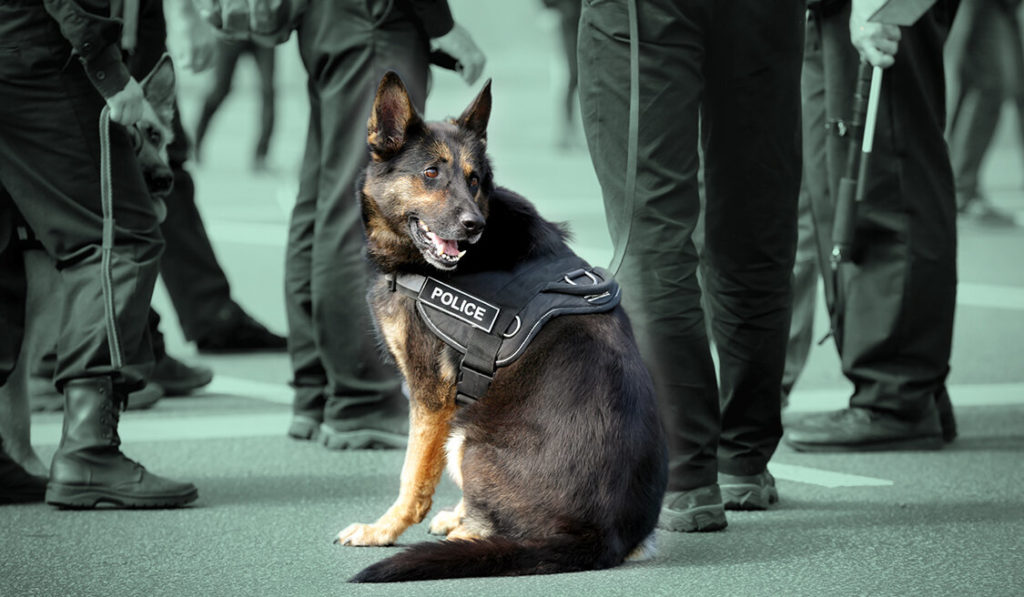A story from last week by Washington D.C. ‘s Fox5 titled “Legalization of marijuana forcing some police K9s in Virginia to retire,” illustrates the way that no problem is too small to be problematized by law enforcement and other opponents of cannabis reform. According to Fox5, local law enforcement is “taking a hit” because of cannabis legalization, “especially in their K9 departments.” In short, the cops won’t be using drug dogs to search for cannabis anymore once cannabis is legal which is now set to happen in July 2021 rather than 2024.
The expedited legalization date was the result of work by activists who argued that moving it forward will more immediately address the racial disparities of the war on drugs. The expedited date has also resulted in a wave of concern from opponents, such as elected officials in Prince George County and Loudoun County who are discussing how they can legalize cannabis within their jurisdictions even after the state legalizes it.
Now, the news is calling attention to the number of drug dogs that will be out of a job due to legalization. But like so many concerns brought up by the news on behalf of policing, less drugs dogs isn’t actually a problem. One of the people interviewed for this story even, Second Lt. Ari Morin of Fairfax County Police, notes that they will simply use these cannabis-sniffing dogs for other tasks. Virginia State Police, according to Fox5, will be retiring 13 dogs trained in smelling cannabis. Indeed, law enforcement in Loudoun County told Fox5 they are retraining its dogs except for one who will now be used to search for cannabis in prisons where it would remain illegal.
These kinds of stories which suggest cannabis legalization is a problem for drug dogs are commonly fed to local news once legalization is imminent. Just the day before the Fox5 article, a New Mexico news channel ran an “investigative” story titled, “Drug sniffing police dogs’ future in limbo with legalization of marijuana.” In 2018, even the New York Times covered this non-story. And since March, there have been at least five other stories about Virginia cannabis legalization and what it means for drug dogs.
The stories may seem harmless but they are a quieter form of “copaganda” which seeks to pose legalization as another problem for police rather than one less thing for the police to police. Back in March, when the July 2021 was approved by Governor Ralph Northam, the police said they would not be “ready” for legalization: they needed more time to figure out how to not arrest people for something.
“I know that we’re not going to be ready by July 1st at all,” Hopewell Police Chief Kamran Afzal told Richmond TV news in March. “The home-grow aspect is very troubling because that’s what Colorado did. It creates a black market; you can’t tell the difference between what’s legally grown and what’s not, and it creates a lot of issues.”
Police have even figured out a way to use cannabis legalization—fundamentally, a strategy moving towards decarceration—to argue that they need more funding so that they can retrain drug dogs.
“We had two drug dogs that we have and we are having to get rid of because we can’t use them anymore because they’re imprinted with marijuana… they smell marijuana,” Scott County Sheriff Jeff Edds told local news. “We’re having to go to the expense of getting new dogs and our guys training with them with no reimbursement from the state at all and most dogs are fairly young and new.”
These stories also reinforce the idea that drug dogs are a necessary part of law enforcement. There is plenty of evidence that drug dogs don’t really work. Namely, drug dogs are susceptible to suggestion which often means police officers tacitly encouraging the dogs to find a “hit” or explicitly pushing the dogs to find a “hit” where there should not have been one to contrive an arrest or even civil asset forfeiture.
A 2012 Supreme Court case, Florida vs. Harris questioned how reliable drug dogs are when they supposedly locate drugs by smell. Data provided by the lawyers for Clayton Harris, who had his car searched after he refused because of a drug dog alerting the police officer who stopped Harris, showed that up to 80% of alerts by drug dogs are inaccurate. The Supreme Court’s ruling did not care about those troubling numbers and ruled that any dog that has been trained and certified to detect drugs is good enough.
In a 2019 Washington Post op-ed titled “The Supreme Court’s ‘Alternative Facts’ about Drug-Sniffing Dogs,” journalist Radley Balko looked at another case involving drug dogs—Edstrom v. Minnesota—and argued that “narcotics-detecting dogs and their handlers aren’t very good at discerning the presence of illegal drugs.” Balko continued by noting that, “multiple analyses of drug-dog alerts have consistently shown alarmingly high error rates — with some close to and exceeding 50 percent. In effect, some of these K-9 units are worse than a coin flip.”
Balko also mentioned another case, United States v. Bentley. There the defendant was searched by a dog who was alerting its handler of the existence of drugs 93 out of 100 times. Balko explained why and it had almost nothing to do with what the dog is actually locating.
“The drug dog’s handler admitted that he rewarded the dog with a treat only when it alerted. The dog was confirming its owner’s hunches, and getting a treat each time it did,” Balko wrote. “It also had a false positive error rate of 41 percent — 4 out of every 10 drivers searched because of a dog’s alert turned out to be innocent.”

